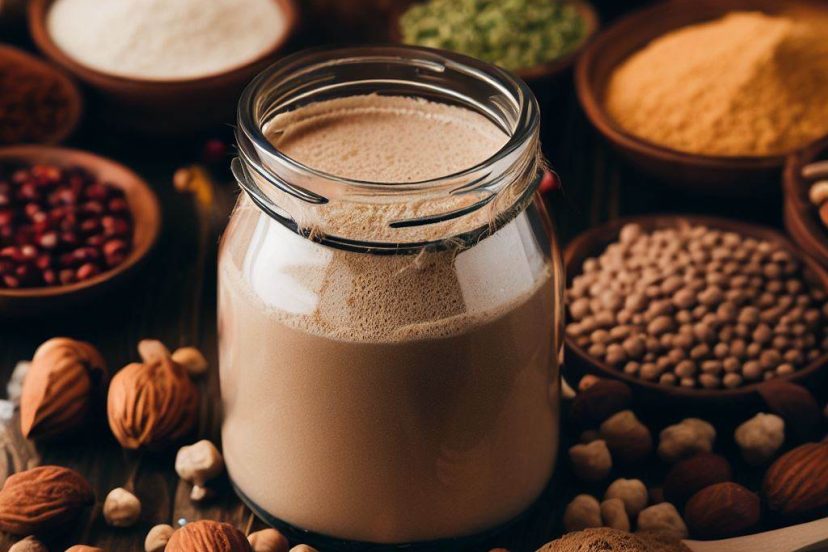Is Whey Protein Vegan? A Deep Dive
*We may earn a commission for purchases made using our links. Please see our disclosure to learn more.
Is Whey Protein Vegan? Uncovering the Truth
When considering protein supplements, many athletes and health enthusiasts turn to whey protein for its high biological value and amino acid profile. However, whey protein is not a vegan option as it is derived from cow’s milk during the cheese-making process, where enzymes separate the milk into curds and whey. The liquid whey is then processed into a powder form, which includes lactose, making it unsuitable for a vegan diet or for those with lactose intolerance.

Understanding the difference between vegan and non-vegan protein sources is essential for maintaining a balanced diet within the constraints of veganism. For those adhering to a plant-based lifestyle, it is important to seek out alternative protein powders that align with vegan principles. These alternatives are typically made from various plant sources, including pea protein, rice protein, and hemp protein, ensuring that vegans have ample options for integrating protein into their diets without relying on animal products.
Understanding Protein Powders
In examining protein powders, it’s crucial to differentiate between sources and understand that options vary for those following vegan lifestyles. Let’s explore the types of protein powders available and the plant-based alternatives to whey protein.
Types of Protein Powders
Protein powders come in various forms, each with its unique attributes. The most recognized is whey protein, which is derived from cow’s milk and is renowned for its complete amino acid profile and rapid digestibility. Non-vegan sources of protein powders include casein, also milk-derived, and usually consumed for its slower release of amino acids. Egg white protein powder is another animal-based option valued for its high digestibility and presence of all essential amino acids.
Table 1: Common Types of Protein Powders and Their Sources
| Type of Protein Powder | Source | Key Characteristics |
| Whey Protein | Cow’s milk | Complete amino acid profile, fast absorption |
| Casein Protein | Cow’s milk | Gradual amino acid release, longer digestion |
| Egg White Protein | Eggs | High in essential amino acids, highly digestible |
Plant-Based Alternatives to Whey Protein
For those seeking plant-based alternatives, numerous options exist. Pea protein stands out for its high protein content and absence of allergenic ingredients like gluten and lactose. Brown rice protein is often praised for its similarity to whey in terms of the amino acid composition, although it might not always offer a complete profile. Soy protein is unique in that it is one of the few plant proteins that provide all essential amino acids, much like whey.
Table 2: Plant-Based Protein Powders and Their Benefits
| Type of Plant-Based Protein | Benefits |
| Pea Protein | Hypoallergenic, rich in iron, and beneficial for muscle growth |
| Brown Rice Protein | Good amino acid profile, easy to digest |
| Soy Protein | Complete amino acid profile, supports muscle recovery and growth |
I recognize the importance of comprehending these differences, especially for individuals with dietary restrictions or those following a vegan lifestyle. Each type of protein powder serves a unique purpose and suits different dietary needs.
Composition and Health Implications
In this section, we’ll examine the nature of whey protein, its amino acid content critical for muscle building, and the health considerations it presents, especially for those with dietary restrictions.
Protein Source Analysis
Whey protein is not vegan, as it is derived from milk, a product of the dairy industry. It consists of a collection of proteins isolated from whey, the liquid byproduct of cheese production. Vegan proteins, on the other hand, are sourced from plants such as peas, rice, hemp, and soy. When considering a vegan diet, it’s important to select a plant-based protein that complements your nutritional requirements while aligning with ethical considerations.
Amino Acids and Muscle Building
Proteins are made up of amino acids, and there are nine essential amino acids that the body cannot synthesize on its own. Both whey and plant-based proteins provide these essential amino acids, but the concentration differs. Whey protein contains a higher amount of leucine, an essential amino acid vital for muscle protein synthesis. For vegan proteins to meet this threshold, they may need to be consumed in larger quantities or combined with other protein sources to achieve a complete amino acid profile.
Health Considerations and Dietary Restrictions
Before integrating whey or any protein supplement into your diet, it’s advisable to consult with a healthcare professional to ensure it aligns with your health goals and dietary restrictions. Individuals who are lactose intolerant, allergic to dairy, or follow a vegan lifestyle should avoid whey protein. There’s also the consideration of potential health implications such as kidney health with excessive protein intake, which underscores the importance of adhering to recommended dietary allowances and seeking guidance from healthcare experts.
Nutritional Comparison of Whey and Vegan Protein

In this section, I’ll dissect the nutritional aspects of whey and vegan protein sources. I’ll shed light on protein content and quality, how our bodies may digest and absorb these proteins, and the vitamins and minerals each provides.
Protein Content and Quality
Whey protein is renowned for its high protein content and completeness, meaning it contains all nine essential amino acids. A typical serving can offer between 20 to 25 grams of protein. On the other hand, vegan protein powders often derive from plants like peas, rice, or hemp, and their protein content per serving usually ranges from 20 to 22 grams. However, certain plant proteins may lack one or more essential amino acids, making many of them incomplete on their own.
Digestibility and Absorption
When it comes to digestibility, whey protein is easily absorbed by the body, due to the presence of digestive enzymes. This rapid absorption aids in muscle recovery and growth. Vegan proteins can vary in digestibility, with some like pea protein being quite digestible, while others may require additional processing to enhance absorption. For individuals with lactose intolerance, vegan protein powders might be more suitable as they are dairy-free and thus easier on the stomach.
Vitamins and Minerals Content
Whey protein often contains essential minerals such as calcium, phosphorus, and potassium. It’s not typically fortified with vitamins, but it can be a good source of minerals like zinc and iron, albeit often in lower quantities than found in vegan sources. Vegan protein powders may be supplemented with vitamins and minerals to improve their nutritional profile. For instance, vegan options tend to provide higher amounts of iron compared to whey, but the availability of this iron can be less than that from animal sources.
Practical Aspects of Protein Supplementation

When considering whey protein and its alternatives, I focus on how they fit into diet plans while accounting for taste and nutritional content. Athletes and others may prioritize protein for muscle growth, but it’s essential to ensure compatibility with a vegan diet.
Taste and Texture Experiences
In my examination of protein supplements, I find that the taste and texture are pivotal for long-term adherence. Whey protein is known for its creamy texture and wide range of flavors, but plant-based alternatives can also deliver satisfying tastes. I recommend trying different brands to find a product that meshes well with your palate. For instance, some vegan protein powders blend exceptionally well with smoothies and shakes, providing a palatable way to increase protein intake.
Considerations for Athletes and Fitness Enthusiasts
For athletes and fitness enthusiasts, protein is indispensable for muscle recovery and growth, particularly after strength training. My advice is to consult with a dietitian who can help tailor your protein intake to your specific workout regimen. While whey protein is popular for its high biological value, vegan athletes have a variety of plant-based protein supplements that are formulated to support athletic performance without compromising their diet principles.
Incorporating Protein into a Vegan Diet
It’s crucial to integrate protein supplements into a vegan diet without relying solely on a single source. I vary my protein sources, including legumes, tofu, and nuts, along with a well-chosen vegan protein powder. This variety ensures that I receive a complete amino acid profile necessary for overall health. If you’re new to vegan protein powders, start by adding them to shakes or smoothies, as this can make the transition smoother and enhance your dietary experience.
Buying Guide for Vegan Protein Powders

When selecting vegan protein powders, it’s essential to focus on plant-based ingredients while considering factors such as additive content and overall value for money.
Key Ingredients to Look For
I recommend looking for complete proteins that provide all essential amino acids. Hemp, pea, and soy protein are excellent choices. Hemp seeds, for instance, offer a complete protein profile and about 5 grams of protein per teaspoon. Pea protein is similarly rich in amino acids, and soy products like tofu, tempeh, and edamame are also complete proteins with variable protein amounts.
- Hemp Seeds: 5g of protein/teaspoon, complete protein
- Pea Protein: Contains all nine essential amino acids
- Soy Products: Tofu, Tempeh, Edamame, amount varies
Avoiding Additives and Allergens
My advice is to look for powders without unnecessary additives or sweeteners that might add calories or cause digestive issues. It’s important to check labels for added sugars and artificial sweeteners. For those with sensitivities, ensure the powder is free from common allergens such as gluten, dairy, and soy.
- Check for added sugars: Opt for powders with minimal or no added sugars.
- Look for allergen-free certifications if you have sensitivities.
Brands and Third-Party Certifications
Navigating the world of vegan proteins can be complex. I’ll be focusing specifically on trusted vegan protein brands and the significance of third-party certifications to ensure product quality and consumer safety.
Trusted Vegan Protein Brands
When selecting a vegan protein powder, credibility lies in the brand’s reputation and consumer trust. Garden of Life and Orgain are two standout brands that have built a strong following. Garden of Life offers a range of organic vegan protein powders, while Orgain is known for its affordable and organic vegan protein offerings. Another notable brand is Vega Sport, which specializes in performance-oriented plant-based proteins. Naked Pea, a minimalistic option, offers pea protein that appeals to those seeking fewer additives. Finally, Ritual Essential Protein is recognized for its thorough transparency in sourcing ingredients.
- Garden of Life: Offers organic and performance-focused vegan proteins.
- Orgain: Known for affordable and organic plant-based proteins.
- Vega Sport: Tailored for athletic performance with plant-based ingredients.
- Naked Pea: Provides simple pea protein with minimal additives.
- Ritual Essential Protein: Stands out for traceable ingredients and clean sourcing.
Importance of Third-Party Testing
Third-party testing is pivotal in the protein supplement industry. This process involves unbiased testing by an independent organization that confirms the purity, safety, and accuracy of product labels. Informed Choice and Informed Sport are key certifications to look for, as they screen for banned substances and contaminants, ensuring the products are safe for athletes and the general public. Registered dietitians often recommend looking for these certifications, as they imply regular testing for heavy metals and other potential contaminants that could otherwise be harmful if present in large quantities.
- Registered Dietitians: Professionals who emphasize the value of third-party testing.
- Heavy Metals: Contaminants like lead, arsenic, and mercury are tested to ensure levels do not exceed safety limits.
- Informed Choice and Informed Sport: Certifications that verify products are free from banned substances and meet quality standards.
- Third-Party Testing: Affirms the integrity of product content, offering peace of mind to consumers.
Choosing a brand with rigorous third-party verification can help me ensure that my plant-based protein is as pure and safe as possible.
Frequently Asked Questions
In this section, I address some of the most common inquiries regarding whey protein and its place in vegetarian and vegan diets, breaking down differences, sources, and options for muscle building.
1. Can vegetarians consume whey protein?
Yes, individuals following a vegetarian diet can consume whey protein as it is derived from milk, which is permissible in lacto- and lacto-ovo vegetarian diets. It is, however, excluded from vegan diets due to its animal origin.
2. What are the primary differences between whey and plant-based protein powders?
The primary differences lie in their sources: whey protein is animal-based, extracted during cheese production, while plant-based proteins are derived from foods like peas, rice, and hemp. Plant-based protein powders often have different amino acid profiles compared to whey.
3. What sources do plant-based protein powders typically use?
Plant-based protein powders typically use ingredients such as peas, brown rice, hemp seeds, and soy. These sources are combined to provide a complete amino acid profile that mimics that of whey protein.
4. How does whey protein compare to plant proteins in terms of muscle building efficacy?
Whey protein is rich in essential amino acids and is highly bioavailable, making it very effective for muscle building. Some studies suggest plant proteins can be equally effective when they contain all nine essential amino acids and are consumed in sufficient quantities.
5. Are there lactose-free options available for those who want whey protein?
Yes, there are whey protein isolates that are processed to remove almost all lactose, making them suitable for individuals with lactose intolerance.





Comments are closed.